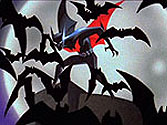 |
 Inqueling
Inqueling
A
wounded Inque hides out with her previously abandoned daughter.
Original Airdate: September
30, 2000
Episode # 46
Rating: * *
|
||
|
|
|
| Credits | Cast | |
Written by Hilary J. Bader Directed by Butch Lukic Music by Michael McCuistion Animation by Koko/Dong Yang |
Will Friedle as Terry McGinnis Cree Summer as Max Gibson Lauren Tom as Dana Tan Shannon Kenny as Inque |
Efran Figueroa as Reporter Clyde Kusatsu as Mr. Fong Peter Mark Richman as Winchell Azura Skye as Deanna Clay |
|
|
|
The backstory: Because she couldn't support her, Inque abandoned her infant daughter Deanna for a life of stylish crime as . . . well, as "Inque." But from the proceeds of crime she has supported the unknowing Deanna long-distance by depositing money into a trust-fund. At the climax, it proves that Inque and Deanna share a common commitment to money over motherhood: Having decided that it was better to give Deanna money than love, Inque should not be surprised to discover that Deanna prefers her mother's money to her mother's love, and betrays her. This is a great theme, powerful, intuitive and convincing. Architecturally it is nicely amplified by comparisons to the Bruce-Terry relationship, which stands as the harmonious contrast to the brittle and debased Inque-Deanna relationship. But this heavy idea, so good in principle, has no dramatic impact in the story that develops. This is because there is no appreciating this terrific conflict between a mother and her daughter if you are completely unaware of the fact there even is a conflict, and for large stretches of "Inqueling" we are completely at sea as to who and what we should be concentrating on: Inque's plight, Winchell's fraud, or Terry's relationship to the absent Wayne. Obviously, the backstory about Inque and Deanna is more interesting than anything else, but the scenes between those two are so fuzzy and vague that we're not sure what they think or how they feel about each other, and so there is no sense that they are on a collision course. And because Deanna's reactions to her mother are so underpowered, her betrayal at the end feels completely arbitrary. To see this, play storyteller with me for a moment: Imagine the episode exactly as it actually plays, up until the moment Batman staggers from beneath those girders. But then instead of Inque suddenly beginning to dissolve, let Batman pull out his secret weapon, zapping and capturing her. Deanna runs up, begging him to let her go, because she's the only mother she's got. Batman remarks that a mother who would give her daughter money instead of love is not a mother worth having. Dissolve to Deanna in her rich new digs, reflecting on the truth of Batman's remark. I know, I know, pretty unexciting, and I sure ain't lobbying for the change. But ask yourself this: With this alternative ending, what is the episode about? Clearly it's no longer about Inque and Deanna, but about Terry, who (as he had pointedly remarked earlier in the episode) would have just demonstrated a new-found skill and maturity to an absent father figure, and would have succeeded thanks to that mentor's continuing attention. To such a story the Deanna/Inque relationship would have functioned as just a counterpoint, showing how a belated reconciliation cannot compensate for years of neglect and indifference. But given what has come before, this alternate ending is exactly as motivated and exactly as plausible as the actual ending; hence, each ending is, from the point of view of the drama that came before, arbitrary. And because this shows that the event which signals the true source of conflict in the narrative is not disclosed until the end, it explains why that narrative itself tends to remain vague and unfocused for virtually its entire length. A good theme (and I repeat: it's a great theme this episode plays with) may partially compensate for a weak story, but it is no substitute for it. To see an episode where theme and plot merge seamlessly and beautifully, so that every event that advances and illustrates one advances and illustrates the other, go back and look at "King's Ransom." |
|
|
|
|
Related
Episodes |
What
Others Are Saying ... |
|
|
| Back
to Hooked Up |
Forward
to
Joyride |